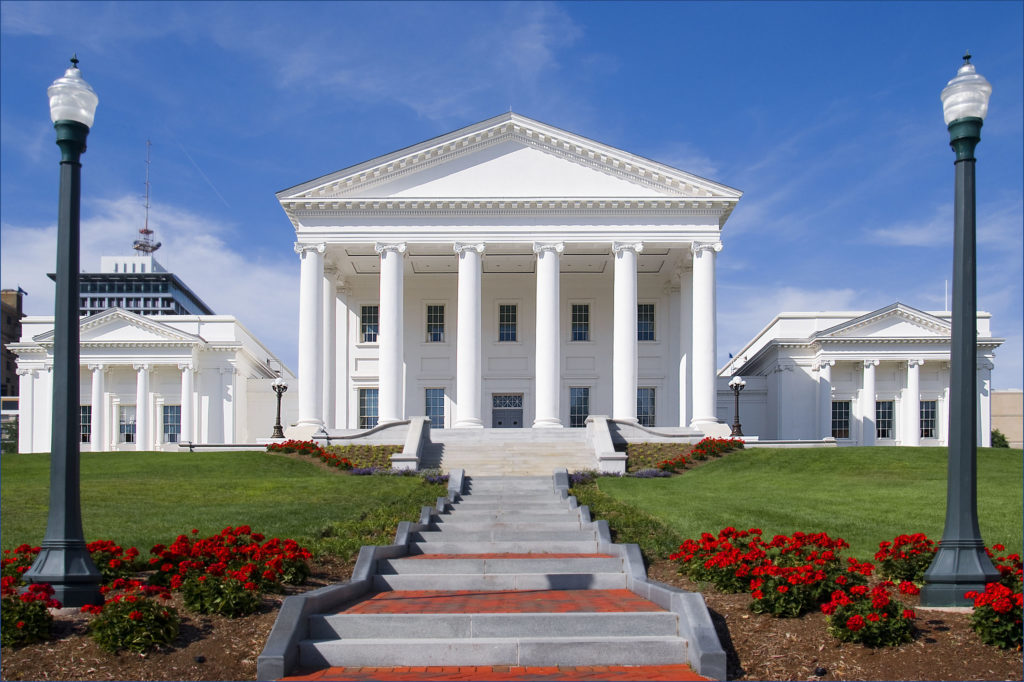
Published March 5, 2022
Charlottesville, Va. — In a keynote address last night at the Federalist Society’s annual student symposium, hosted this year at the University of Virginia, Republican governor Glenn Youngkin focused his remarks on the value and importance of federalism and state government.
He noted that the Founders likely wouldn’t be surprised to see how little Congress is able to accomplish today and that, by contrast, state governments across the country are continuing to innovate on policy. “Today, it’s the states — and, I might add, the states led by Republican governors — that are charting the future and getting things done,” he said.
Youngkin’s remarks came just a day or two after a Roanoke College poll finding that the governor is more popular than President Joe Biden among Virginians.
Youngkin said he agrees with some that there are reasons to be concerned about our constitutional democracy, but added, “The heart of our democracy today is in the states, and that heart is healthy.”
The central example Youngkin offered was of his experience in last November’s election and his subsequent effort to work with a bipartisan group of legislators to remove school districts’ mask mandates.
“Trusting parents was a major theme of this last election cycle. I have to say it was one of the major contributions to our winning,” Youngkin said. “And on the first day in office, I reversed the previous executive order and gave parents the decision on masks.”
He summed his policy up in a few simple phrases: “If they want their kids to wear a mask, then wear one. And if they don’t think it’s in the best interest of their child, then don’t.”
Youngkin noted that this move, one of the very first policy decisions he made immediately after taking office, hardly made him popular. “I was called everything but a gentleman,” he said.
But he was surprised by what happened next: “Then we found that a number of Democrats [in the legislature] agreed. They decided to follow the parents instead of the party line. . . . And less than a month after taking office, I signed legislation resolving the mask war in favor of parents. Let’s let parents decide.”
Parental rights was a major theme of Youngkin’s campaign, especially in its later months, after his Democratic opponent Terry McAuliffe repeatedly said that parents had no place in the classroom.
Later in his remarks, Youngkin insisted that Vladimir Putin is a “tyrant,” but he argued that the greatest threat to our democracy will come from here at home, and he mentioned in particular the “desire to bully and not persuade. . . . This cancel culture is toxic to our democracy.”
Youngkin also spoke briefly about the importance of impartial judges. “An independent judiciary is an indispensable part of our constitutional system,” he said. “But judges can make self government impossible. They thwart the will of the people when they bend the law to suit their own purposes.”
Youngkin is a compelling speaker, but hearing him last night confirmed for me that his greatest appeal is how normal he is. He knows his stuff when it comes to the Constitution and federalism, sure. But his greatest strength as a politician honestly might be that he comes across like a totally normal, relatable guy who loves America and loves watching basketball and wants his kids to understand why it’s important to do their homework. In the climate of last year’s election in Virginia, it’s no wonder why a guy like that was able to pull off the win he did.
Alexandra DeSanctis is a staff writer for National Review and a visiting fellow at the Ethics and Public Policy Center.
Image: Flickr/Ron Cogswell
EPPC Fellow Alexandra DeSanctis writes on culture and family issues, with a particular focus on abortion policy and pro-life advocacy, as a member of the Life and Family Initiative.








